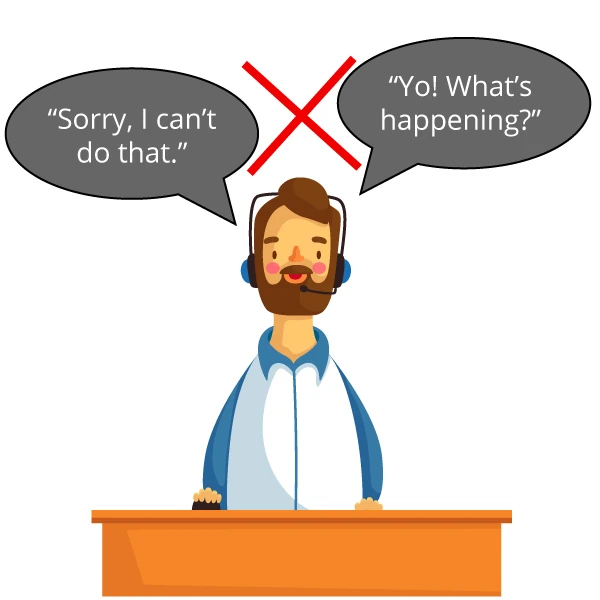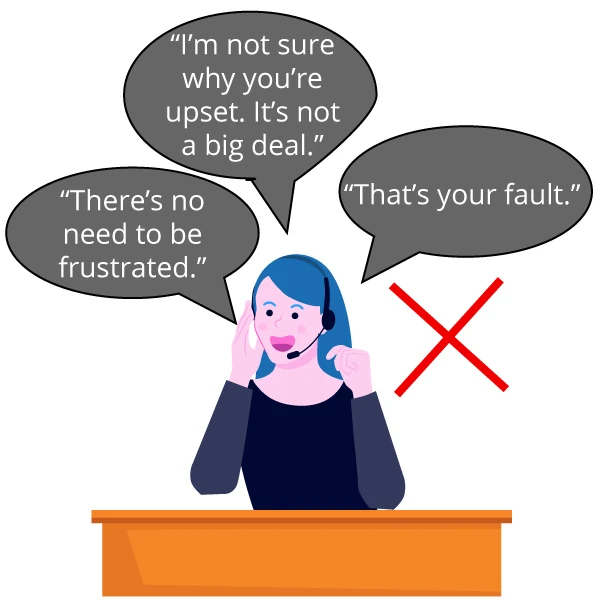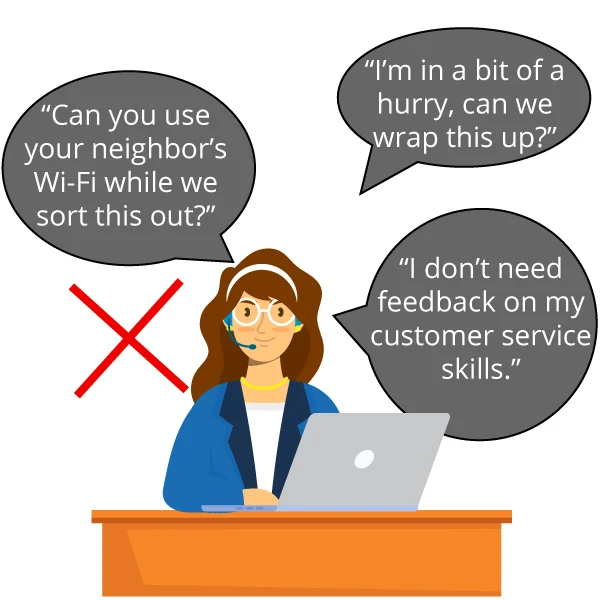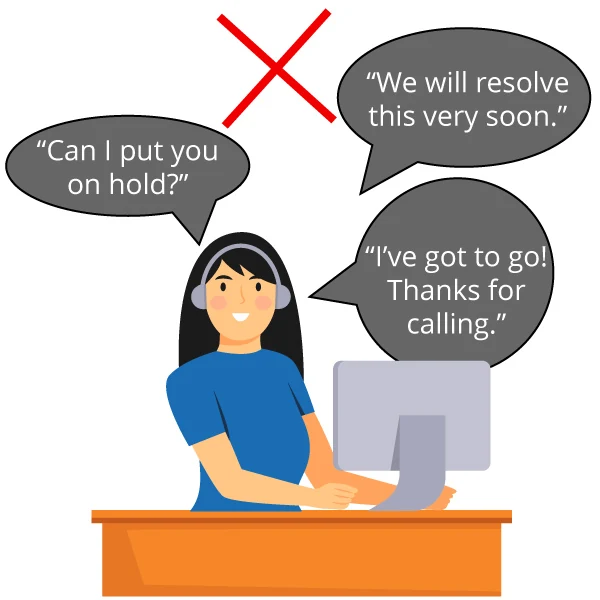Welcome to the ultimate guide on what not to say if you want to avoid sending your customers into a frustration-fueled frenzy. Knowing what to steer clear of is just as important as mastering the right things to say. Certain phrases can trigger negative reactions or convey unintended disrespect.
This guide highlights eleven phrases that call center agents should avoid to maintain professionalism and foster positive customer experiences. By steering clear of these pitfalls, agents can improve their communication skills and contribute to a higher standard of service.
Common Mistakes in Call Center Communication

1. “Sorry, I can’t do that.”
Focusing on what you can't do is not the right way to resolve a call.
When interacting with customers, call center agents should steer the conversation toward solutions and alternatives rather than emphasizing limitations. Statements like "There's nothing I can do" or "That's our policy, I can't help with that" immediately communicate a dead end to the customer. This approach not only frustrates the customer but also closes the door on potential resolutions.
Instead, agents should focus on what can be done, such as offering comparable alternatives or escalating the issue to someone with more authority. By doing so, they foster a more positive interaction and keep the lines of communication open.
2. “Yo! What’s happening?”
The use of jargon or overly technical language can alienate customers and create a barrier to effective communication.
When agents say things like, "Please reboot your terminal interface to initiate a new protocol," customers may feel confused and disengaged. It is crucial for agents to speak clearly and use language that is accessible to the average person.
Simplifying complex processes into easy-to-understand steps is a critical skill in customer service. For instance, instead of using technical terms, an agent could say, "Could you please turn your device off and on again? This often fixes the issue."
Lack of Empathy and Understanding

3. “There’s no need to be frustrated.”
Ignoring or failing to acknowledge a customer’s emotions can significantly damage the rapport and trust necessary for effective service.
When a customer is upset or frustrated, they seek understanding from the service provider. Saying things like "I don’t see why this is so upsetting to you" is counterproductive. Instead, call center agents should employ statements that recognize the customer’s feelings, such as, "I can understand why you’d be upset about this, and I’m here to find a solution."
Acknowledging the customer’s feelings is the first step towards a constructive resolution.
4. “I’m not sure why you’re upset. It’s not a big deal.”
Invalidating a customer's complaint is one of the quickest ways to escalate an already tense situation.
Phrases like "No one else has complained about this" or "It’s not usually a problem" can make customers feel their issues are insignificant or unheard. These phrases can convey that the customer's experience is an outlier that is irrelevant to the company.
Rather than dismissing their concerns, agents should validate and reassure them. A better approach could be, "Thank you for bringing this to our attention. Let’s see how we can fix this together." This not only validates the customer’s experience but also actively involves them in the solution process.
5. “That’s your fault.”
Laying blame on the customer can irreparably harm the relationship between them and the company.
Statements such as "You must have done something wrong" or "If you had followed the instructions, we wouldn’t be having this issue" directly accuse the customer and can lead to negative reactions, including anger and dissatisfaction.
A more appropriate response lies in collaboratively solving the problem, regardless of its origin. Phrases like, "Let’s go through the steps together to see where things went wrong," or "I’m here to help us figure this out." This approach maintains a positive, cooperative interaction and leads to better outcomes.
By avoiding these common communication errors, call center agents can significantly enhance the quality of customer service they provide. This not only ensures higher customer satisfaction but also fosters loyalty and improves the overall perception of the company.
Ineffective Problem-Solving

6. “Can you use your neighbor’s Wi-Fi while we sort this out?”
One critical error call center agents make is proposing unrealistic solutions to customer problems.
When agents offer fixes that aren’t feasible, it not only undermines the trust of the customer but also demonstrates a lack of understanding of their issues. For instance, suggesting a replacement product that’s out of stock or promising a service that the company can't provide quickly can frustrate customers further.
Agents must ensure they fully understand the company's capabilities and the situation before making any promises. This approach helps maintain credibility and enhances customer satisfaction by aligning expectations with what is genuinely achievable.
7. “I don’t need feedback on my customer service skills.”
Ignoring customer feedback is another significant misstep in call center operations.
Feedback, whether positive or negative, is a goldmine of information that can help improve services and customer satisfaction. When agents dismiss or overlook feedback, they send a message that the customer’s opinion and experiences are not valued. This perception can lead to customer churn, as customers may look for other service providers who value their input and are willing to make adjustments based on their experiences.
Agents should be trained to listen actively to feedback and escalate important issues to the proper departments.
8. “I’m in a bit of a hurry, can we wrap this up?”
In the high-pressure environment of a call center, agents might be tempted to rush through calls to meet quotas or reduce wait times.
However, rushing the interaction can lead to misunderstandings and unresolved issues, requiring the customer to call back multiple times. This not only reduces efficiency but also deteriorates the overall customer experience.
It's crucial for agents to take the time to fully understand the issue, explore all possible solutions, and ensure the customer is satisfied before concluding the call. Patience and attentiveness are key elements in delivering exceptional customer service.
Poor Communication and Follow-Up

9. “Can I put you on hold?”
Placing customers on hold indefinitely without clear communication or regular check-ins can be extremely frustrating for them. It often leads to increased dissatisfaction and perceived neglect.
Call centers should enforce guidelines that specify the maximum hold time, and agents should inform customers about the expected wait time and the reason for the delay. For example, if an agent is putting a customer on hold, they should say, “Do you mind if I put you on hold? It should only be for X minutes.”
Regular updates about the status of their issue or request should also be provided. For instance, “Hello, just checking in with you to let you know that you’re now third in line and should be connected to an agent in about 10 minutes.” Establishing such practices will help maintain the flow of communication and reassure customers their concerns are being addressed.
10. “We will resolve this very soon.”
Telling a customer that their problem will be resolved immediately without ensuring proper follow-up is a practice that is frustrating for customers.
Customers often have busy lives that they need to attend to, and when they are not given a time estimate for resolving an issue, it can be hard to plan around it. Promises made during customer interactions must be tracked and fulfilled to maintain trust. Failure to do so often leads to further complaints and loss of business.
For example, if a customer calls about Wi-Fi issues, and the agent is not able to resolve the issue during the call, the agent should say, “I sincerely apologize that we have not been able to fix your Wi-Fi issues on this call. I’m going to look into this, and you will hear back from us within an hour with an update.”
Every commitment an agent makes should be recorded and revisited to ensure completion. Creating a systematic follow-up process can significantly enhance the effectiveness of solving customer issues and builds long-lasting customer relationships.
11. “I’ve got to go! Thanks for calling.”
An abrupt closure of a call is deemed rude and unprofessional, giving the customer a sense that their issues are not fully resolved or that they are not important.
Ensuring a proper closure is critical in any customer interaction. Agents should summarize the conversations, confirm that all the customer’s issues have been addressed, and ask if there’s anything more that can be done to help.
For example, an agent should say something along the lines of, “Now that your Wi-Fi is back up and running, is there anything else I can help you with?” and “Thank you for calling us, I hope you have a great rest of your day. Please give us a call if anything else comes up.”
This not only assures the customer that they have been heard and helped but also sets a positive tone for any future interactions. Always end the call with a polite farewell and an invitation to contact again if further issues arise.
